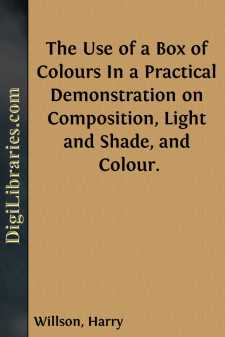Categories
- Antiques & Collectibles 13
- Architecture 36
- Art 48
- Bibles 22
- Biography & Autobiography 813
- Body, Mind & Spirit 142
- Business & Economics 28
- Children's Books 17
- Children's Fiction 14
- Computers 4
- Cooking 94
- Crafts & Hobbies 4
- Drama 346
- Education 46
- Family & Relationships 57
- Fiction 11829
- Games 19
- Gardening 17
- Health & Fitness 34
- History 1377
- House & Home 1
- Humor 147
- Juvenile Fiction 1873
- Juvenile Nonfiction 202
- Language Arts & Disciplines 88
- Law 16
- Literary Collections 686
- Literary Criticism 179
- Mathematics 13
- Medical 41
- Music 40
- Nature 179
- Non-Classifiable 1768
- Performing Arts 7
- Periodicals 1453
- Philosophy 64
- Photography 2
- Poetry 896
- Political Science 203
- Psychology 42
- Reference 154
- Religion 513
- Science 126
- Self-Help 84
- Social Science 81
- Sports & Recreation 34
- Study Aids 3
- Technology & Engineering 59
- Transportation 23
- Travel 463
- True Crime 29
The Use of a Box of Colours In a Practical Demonstration on Composition, Light and Shade, and Colour.
by: Harry Willson
Description:
Excerpt
COMPOSITION.
'Genius is the power of making efforts.'
Erroneous opinions, once formed, seldom fail to affect the taste of a man's character through his whole life. It is, therefore, of the utmost necessity that his conduct be rightly directed.
'Art will not descend to us, we must be made to reach and aspire to it.'
'The great art to learn much,' says Locke, 'is to undertake a little at a time.' And Dr. Johnson has very forcibly observed—'That all the performances of human art, at which we look with praise or wonder, are instances of the resistless force of perseverance: it is by this that the quarry becomes a pyramid, and that distant countries are united by canals. If a man were to compare the effect of a single stroke with a pickaxe, or of one impression of a spade, with the general design and last result, he would be overwhelmed with the sense of their disproportion; yet those petty operations, incessantly continued, in time surmount the greatest difficulties; and mountains are levelled, and oceans bounded, by the slender force of human beings.
'It is, therefore, of the utmost importance, that those who have any intention of deviating from the beaten roads of life, and of acquiring a reputation superior to names hourly swept away by time, among the refuse of fame, should add to their reason and spirit the power of persisting in their purposes; acquire the art of sapping what they cannot batter; and the habit of vanquishing obstinate resistance by obstinate attacks.'
To the many, of different ages, of different pursuits, of different degrees of advancement, who may take up this work, it will be difficult to address myself, as the mind requires instruction adapted to its growth; but I trust to being enabled to protect industry from being misapplied.
To such as desire to shorten the path to excellence, and to whom rules appear as the 'fetters of genius,' from mere impatience of labour, if their studies be not well directed, they will, just in proportion to their industry, deviate from that right way, to which, after all their exertions, they will have to return at last. It will be time enough to destroy the bridge when we have attained the shore. To render our efforts effectual, they must be well directed; and the student will ultimately triumph over those rules which before restrained him.
Begin wrong, and you are no sooner under sail, than under water!
When a difficulty presents itself, attack it as though you meant to overcome it, and the chances are you succeed.
Do not fancy that you have, or that you want, that illusion, inspiration; but remember Art is to be acquired by human means; that the mind is to be expanded by study; and that examples of industry abound to show the way to eminence and distinction. 'He must of necessity,' says Sir Joshua Reynolds, 'be an imitator of the works of other painters. This appears humiliating, but is equally true; and no man can be an artist, whatever he may suppose, on any other terms. For, if we did not make use of the advantages our predecessors afford us, the art would be always to begin, and consequently remain always in an infant state.' And we shall no longer require to use the thoughts of others when we have become able to think for ourselves: 'Genius is the child of Imitation.'
There are no excellencies out of the reach of the rules of art—nothing that close observation of the leading merits of others, nothing that indefatigable industry cannot acquire....


